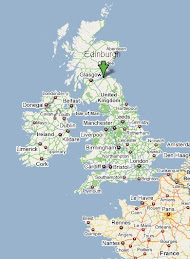As you can see, CDC is a huge, new high school, built to Thai standards for educational buildings, a million miles away from Hle Bee's buildings. The following photos show some of the school's 1200 Burmese pupils arriving for school. They gather first for daily assembly in a huge hall, where they sing the Thai national anthem.



Below you can see the scale of the school, the green-roofed building is one of 4 the same size. A peek in the computer room showed a room full of state of the art computers, promising fantastic quality learning opportunities for these high school students.

And so the Headteachers and curriulum leaders gathered for 3 hours to hear about the development of a new curriculum in Scotland, which I tried to make relevant to what I knew of their situation. A group of curriculum leaders are working together to do 2 things;
1) Prepare a paper for the United Nations on the state of education for Burmese migrant children in Thailand
2) Negotiate a core Burmese curriculum with the Thai Authorities to enable Burmese learning centres and schools to meet Thai standards and be officially ratified, if not accredited.
Scotland is in the midst of nationally negotiating a new curriculum so I shared key messages that
- the curriculum should be child centred
- should be broad enough to allow for local schools to create a meaningful curriculum for their children, families and community
- the curriculum should be linked to skills for life and work
- learning and teaching needs to take account of the needs of individuals and groups within a class.
- Early Years Education is of utmost importance because here the resources are prioritised towards the older children who typically seem to have the best teachers and resources
The teachers were fascinated by the insights I shared from Emotional Literacy theory and the definitions of self esteem and emotional literacy that I shared clearly resonated with their experiences of teaching vast numbers of children suffering the pain of separation from their parents, families and homeland. This is an area that I think they could listen to for hours and it may be they feel the way we first felt when we heard about Emotional Literacy 6 years ago in an education climate of assessment being all that mattered. This is what it's all about - giving children skills for coping and flourishing in life.




1 comment:
Thank you very much for sharing beautiful experience.
Post a Comment